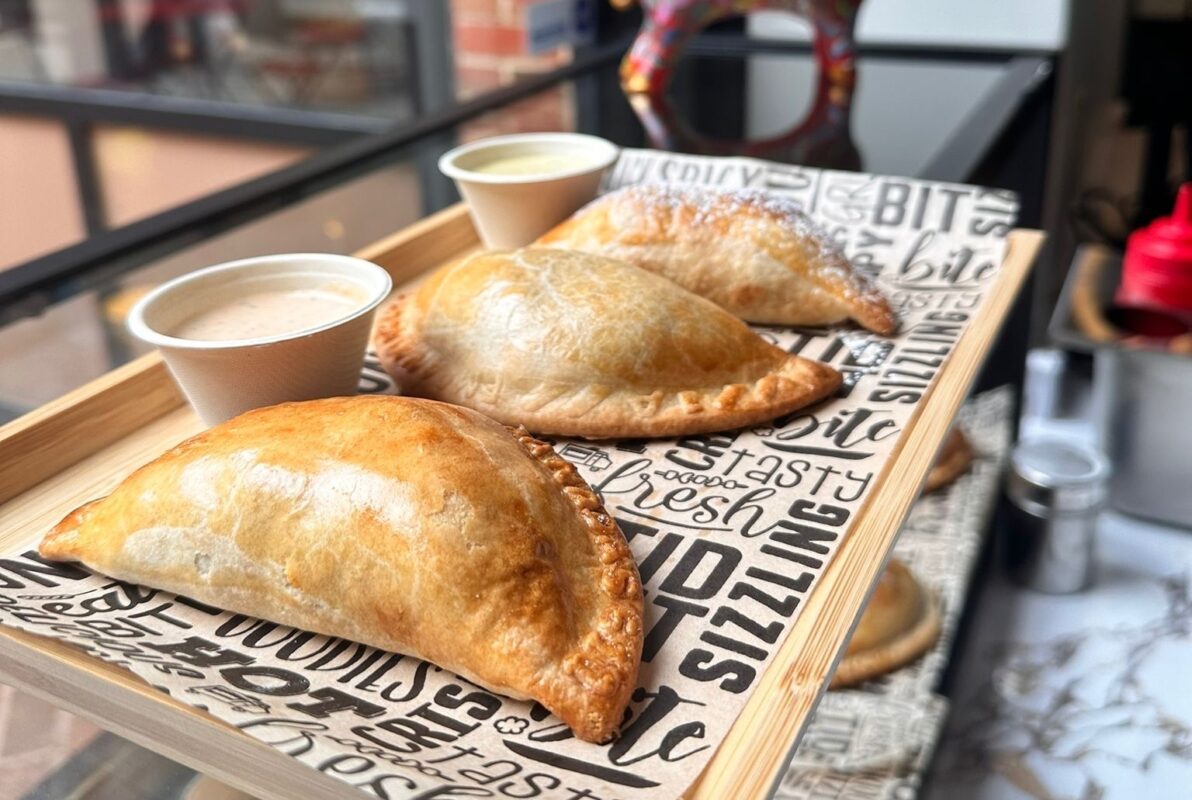
Tucked inside a pedestrian brick alley off of Thames Street is a new fast-casual concept from Chef Jose Victorio Alarcon, whose Peruvian prix-fixe fare at Puerto 511 has been a downtown favorite for the past decade.
Fittingly named Empa511, (511 is the area code to call Peru) the spinoff highlights seven flavors of his handmade Peruvian empanadas, including a family dough recipe and three classic dipping sauces, like the rocotito—a Peruvian pepper in the aji family with garlic, oil, salt, and pepper.
Most South American countries have an empanada, and for the average American, the Argentine version is the most well known, usually with a beef or chicken filling. The Peruvian dough differs in that it has flour, butter, and just a little bit of sugar.
After soft launching over Memorial Day weekend, Empa511 is now operating in full force, open Tuesday through Sunday from 11 a.m. to 8 p.m. The opening empanada menu contains classic Peruvian fillings like Lomo Saltado, a popular Peruvian and Asian-fusion beef stir fry dish that’s tomato and onion heavy, seasoned with soy sauce, and served on a bed of fries.
There’s also an ode to Anticuchera, a grilled skewer traditionally made with beef or chicken hearts. Instead of organ meat, the empanada version is filled with hand cut chicken thigh pieces in an anticucho sauce—a vinegar spice blend that includes cumin, aji, and garlic.
Empanadas—the handheld pockets stuffed with meats, cheeses, and spices—are deeply personal to Alarcon, who grew up in an independent seaside port city within Lima city limits (hence Puerto 511’s name.) He’s eaten them his entire life and vividly remembers making dough with his grandmother and mother, whose recipe lives on in Empa511, and eating them on Sundays as a child.
“There’s these tricycle carts with empanada vendors [that you frequent] from grade school to college,” Alarcon explains, “it’s a staple.”
Locals might remember Andina, a similar, now-closed empanada concept that Alarcon opened near Lexington Market with his ex-wife in 2019. In their separation, she kept Andina, while he continued to operate Puerto 511. But he never stopped dreaming about the street food staple.
“It really hurt to see Andina close,” Alarcon laments. “I kept talking about empanadas for at least three years, and how I would once again open another empanada venture.”
Opportunity knocked again last summer, when Alarcon was walking along the Fells Point promenade with his partner, general manager Patricia Madrid, and happened upon a for-rent sign at the former Sofi’s Crepes off of Thames. Upon seeing the space (with a big, pet-friendly outdoor seating area) he was determined. When phone calls went unreturned, he showed up to the real estate agent’s office.
“Opening Empa511 was a rematch of sorts,” he says. “When you fall, you say you lost this time, but life gave me another chance to get up and keep going.”
This time around, Alarcon is also fulfilling a desire to provide portable food with an eco-friendly mission. He sources biodegradable dishware and paper products, there are no plastic water bottles (there’s a free water station for patrons), and the sodas for sale are all aluminum, including the national soda of Peru, the Inca Kola.
“The theme of reducing plastic and respecting the environment was a driving force,” he says.
Upon entry, you’ll notice a sign above the self-ordering kiosk with a recycling logo embedded into an empanada shell outline, which reads: “we try to reduce up to 90 percent of the use of plastic in our entire restaurant from preparation to the final product, welcome to the hand food revolution.”
Alarcon says Empa’s other main differentiation is in the taste and ingredients. His team painstakingly makes their own dough and grounds their own meats, using his grandmother’s recipe. They’re also choosing to bake their empanadas, making them a bit healthier but also reducing oil waste.
“Our philosophy is that the exterior is very important, but you can’t hide the beauty of the interior,” he says.
